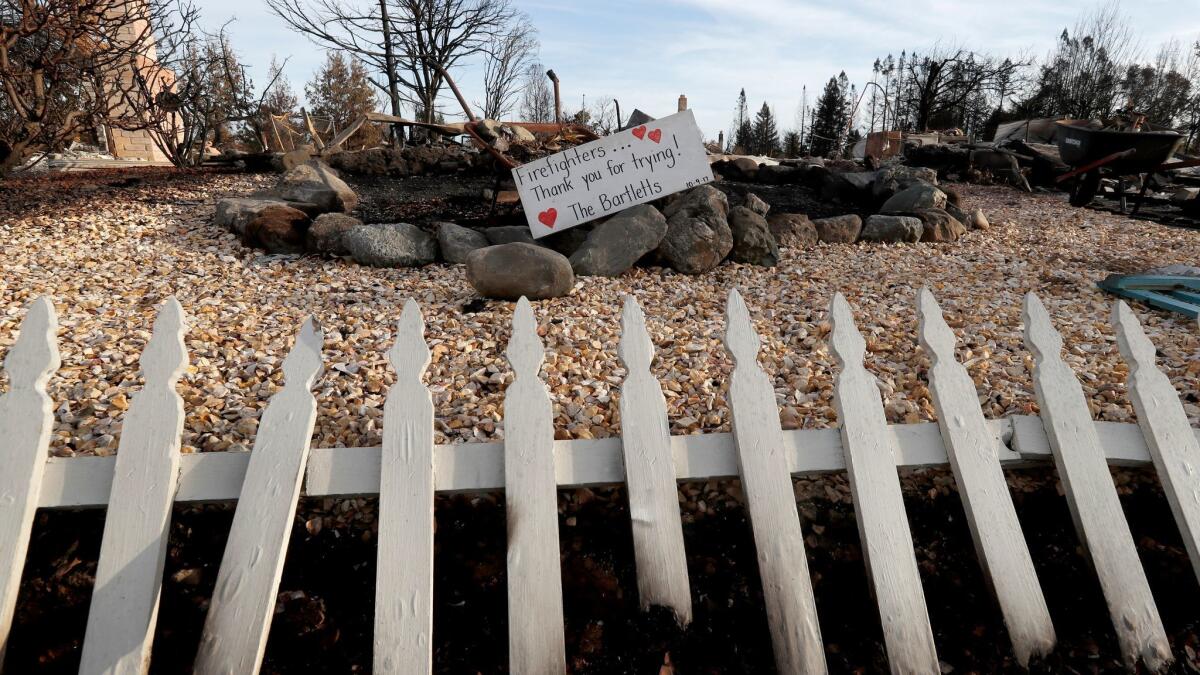After the flames, allegations of rent-gouging fly in devastated wine country communities
- Share via
Kalen Wehagen thought her troubles were over after her apartment survived the wildfires that ripped through California’s wine country.
But the sense of relief wouldn’t last long. Within weeks, Wehagen said her family was handed a 60-day eviction notice. She said the property owner informed them that their Santa Rosa apartment would be remodeled and that they could return if they paid an extra $700 a month in rent — after already hiking the rent 10%.
Scores of residents like Wehagen have alleged rent gouging after the October firestorms torched thousands of homes, leaving many people without homes and exacerbating an already severe housing shortage.
As the wildfires ravaged Northern California, Gov. Jerry Brown on Oct. 9 declared a state of emergency, making it a crime under the state’s anti-price gouging law to raise the prices of goods and services, including housing rentals, more than 10%. The governor extended the ban through April 18.
But in the areas hardest hit by fires, rents have skyrocketed and prosecutors say allegations of rent gouging are often not clear-cut.
The median rent listing increased from September to October by 32% across Sonoma County, 23% in Napa County and 16% in Santa Rosa, according to Zillow Real Estate Research. Neighboring counties unaffected by the wildfires showed little change in the median rent price.
Most of the listings are new, suggesting that at least some were vacation-home rentals on websites like Airbnb before the fires hit, according to an article by Aaron Terrazas, a senior economist at Zillow.
That disqualifies the owners from being prosecuted as rent gougers, a fact that has frustrated Sonoma County Dist. Atty. Jill Ravitch. She said her office has been “hamstrung” by the explosion of online vacation-home rentals.
The homes, which are usually rented at a premium on a short-term basis, are being rented long term at the same rates, Ravitch said.
The wildfires’ destruction also led to other distortions of the market. Insurance companies have engaged in bidding wars for renting scarce properties, paying multiple times the market rate for housing, Ravitch said. Renters whose insurance companies are footing bills that can be upward of $10,000 a month are probably thankful just to have a place to live and are not likely to report price gouging, she said.
Landlords can also legally evict tenants like Wehagen if the stated purpose is to remodel, according to Ronit Rubinoff, executive director at Legal Aid of Sonoma County. State law also makes an exception to the 10% price hike cap if the cost of the remodel is included.
The property manager and owner of Wehagen’s apartment complex did not return calls seeking comment.

But all of these things “skew the market” and make “it difficult for us to apportion any criminal liability,” Ravitch said.
Ravitch said her office has investigated more than 140 complaints, but so far prosecutors have filed only three criminal cases. The property owners of one home are facing a misdemeanor charge after listing a home at $3,400 per month but ultimately renting it for $10,000, according to the charging document.
Joshua Howard, senior vice president of the California Apartment Assn., said Santa Rosa city law makes it clear that it is illegal to evict a renter for the purposes of raising the rent on the new tenant — even if the stated reason was an apartment remodel. City and county authorities should focus on investigating those “bad actors,” he said. He also said officials should look into creating temporary, manufactured housing for people displaced by the fires as a way to alleviate high demand.
The tragedy has also widened the gap between the haves and the have-nots, leaving wealthier property owners with massive insurance payouts and lower-income tenants with higher rents. Evictions are up 20% at a time of year when they usually drop, according to Rubinoff.
Some owners of destroyed higher-end homes had insurance payouts that were generous enough for them to buy a replacement home and a second rental property, said Daphne Peterson, a Santa Rosa-based real estate broker. Other wealthier homeowners lost their primary residence in a fire, then kicked out the tenants of their rental properties so they could move in, she said.
“There’s a lot of tension in our market right now,” Peterson said. “Sellers of certain types of housing can command a premium price because we lost so many homes in the higher-end price bracket.”
The Santa Rosa City Council has tried to intervene on behalf of renters. The council in December was set to pass a just-cause eviction law that would have required property owners to have good reason — such as nonpayment of rent — for ousting tenants. But it turned out that three of the seven council members are themselves landlords, raising concerns of a possible conflict of interest. The council is scheduled to take up the law again Jan. 9, according to Mayor Chris Coursey.
Meanwhile, Wehagen and her family are in a tough spot. The 36-year-old new mother gave birth to her first baby Nov. 15, just nine days before she and her husband received their eviction notice. Their income is modest. She works at an eating-disorder clinic as a dietetic technician and as a masseuse and her husband works at a local grocery store as a wine specialist.
Wehagen said they’re turning down the landlord’s offer.
Instead, Wehagen said they’re going to rent a duplex with a yard somewhere else for $1,850, a little above the price her current landlord wanted her to pay. Some one-bedroom apartments have been going as high as $2,200, she said, which is the absolute maximum she and her husband can afford.
“It’s really crazy,” Wehagen said.
More to Read
Sign up for Essential California
The most important California stories and recommendations in your inbox every morning.
You may occasionally receive promotional content from the Los Angeles Times.











